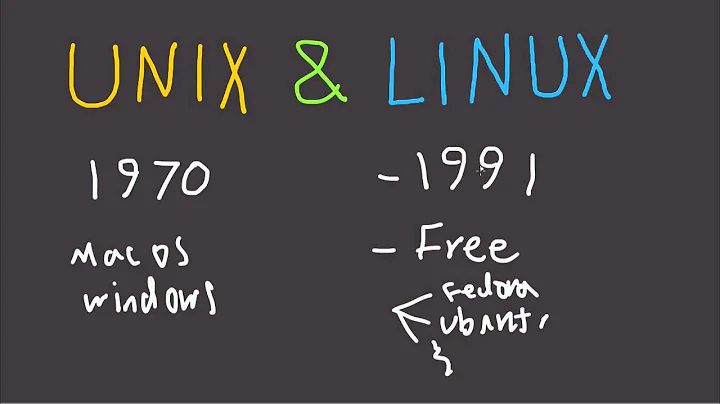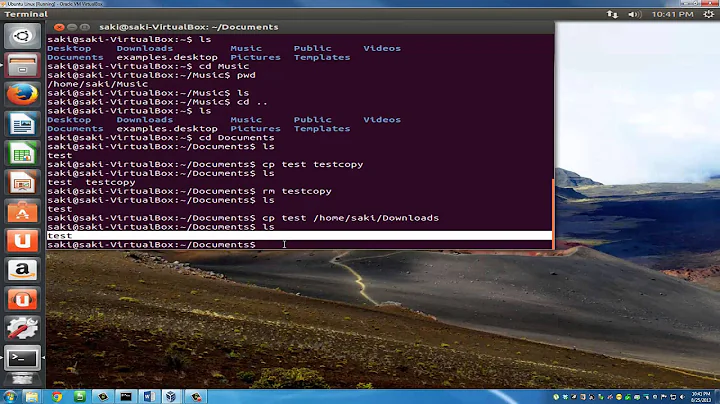What is the correct way to refer to LINUX/UNIX generically?
Solution 1
Terminology is complicated because there are several Unix-like OS kernels and some flavours of non-kernel (user-space) OS software.
- “Unix-like” or “*nix” – anything derived from original Unix and vaguely resembling it.
- “Linux”, “GNU/Linux”, a “Linux distribution” – systems based on the Linux kernel.
- “GNU” – a collection of open-source Unix-like software, excluding the kernel, otherwise sufficient to build an OS. Can run on Linux and other Unix-like kernels.
- “Debian” – a distribution of open-source operating systems, based on “GNU”, united by its package management system. Variants with Linux, arguably the most important Debian, are called “Debian GNU/Linux”. Not all Debian OS variants are Linux.
Ubuntu technically is a modification of Debian, not its flavour.
Additional tips:
- POSIX-oriented (narrower) and POSIX-compliant (broader) – encompasses virtually all modern Unix-likes, but includes also some systems that are not Unixes internally but can run some Unix-like applications.
Solution 2
Ubuntu is most certainly not a flavor of Debian! It is a Debian-based distribution, that's different. KUbuntu is a flavor of Ubuntu. You only call something a flavor of foo when it is a foo. Ubuntu is not a Debian so it can't be a flavor of Debian.
Linux is a kernel and, combined with user space tools, can form the core of an operating system. The most common such system is formed by combining the kernel with the GNU toolset. This is what most of us mean when we say Linux. According to some, it is more correctly referred to as GNU/Linux.
You then have many distributions which package various bits and pieces of software together to build a full-fledged operating system. Many of these distributions are based on one another. For example, Canonical takes Debian, adds its own packages and tweaks and calls it Ubuntu. Mint takes Ubuntu, adds its own things and produces Linux Mint. These are not flavors of each other. They are just based on one another.
Anyway, the generic term of all UNIX and UNIX-like operating systems is *nix (usually pronounced as "nix" or "starnix"). This includes UNIX, Linux, OSX, BSD and various other operating systems.
Solution 3
As shared by people above, the most encompassing title would be GNU/Linux as almost all distributions have the GNU tools. You could even use GNU/FreeBSD if you are using some sort of BSD toolkit/distribution.
Look forward to hearing what you finally used.
Solution 4
Unix(trademarked as UNIX) is a family of multitasking, multiuser computer operating systems that derive from the original AT&T Unix. Development started in 1969 and announced outside Bell abs in October 1973.
Linux is a Unix-like computer operating system assembled under the model of free and open-source software development and distribution. The defining component of Linux is the Linux kernel, an operating system kernel first released on September 17, 1991 by Linus Torvalds.
Linux is packaged in a form known as a Linux distribution (or distro for short) for both desktop and server use. Some of the most popular and mainstream Linux distributions are Arch Linux, CentOS, Debian, Fedora, Gentoo Linux, Linux Mint, Mageia, openSUSE and Ubuntu, together with commercial distributions such as Red Hat Enterprise Linux
GNU is an operating system and an extensive collection of computer software. GNU is composed wholly of free software most of which is licensed under the GNU Project's own GPL. GNU is a recursive acronym for "GNU's Not Unix!", chosen because GNU's design is Unix-like, but differs from Unix by being free software and containing no Unix code. Development of the GNU operating system was initiated by Richard Stallman while he worked at the Massachusetts Institute of Technology (MIT) Artificial Intelligence Laboratory in 1983.
Related videos on Youtube
Admin
Updated on September 18, 2022Comments
-
 Admin over 1 year
Admin over 1 yearIf someone refers to "Windows" then everyone understands that as a generic reference to covers any or all versions of Windows. As for Macs, I have very little personal experience but I assume that "MacOS" is sufficient to do the same.
However, when referring to other OS' (see 'UNIX tree') how should someone make reference to be understood? For example, I'm most familiar with Ubuntu but also am familiar with Mint and Fedora. As I understand it:
- Ubuntu is a 'flavour' of Debian
- Debian is 'UNIX-like'
- UNIX is the 'grandfather' of a whole family of OS':
- Debian is 'UNIX-like'
-
 Admin over 8 yearsMacOS might be less general than you assume. For me it associates with the old M68k CPUs, which is different from modern OS X.
Admin over 8 yearsMacOS might be less general than you assume. For me it associates with the old M68k CPUs, which is different from modern OS X. -
 Admin over 8 yearsNote that your chart is kernel families, which is a whole different thing from distribution families.
Admin over 8 yearsNote that your chart is kernel families, which is a whole different thing from distribution families. -
 Admin over 8 yearsUnix 32v sounds like a power hog.
Admin over 8 yearsUnix 32v sounds like a power hog.
- Ubuntu is a 'flavour' of Debian
-
 Incnis Mrsi over 8 years"Linux" as interchangeable for UNIX? In which context?
Incnis Mrsi over 8 years"Linux" as interchangeable for UNIX? In which context? -
Centimane over 8 yearsI'm saying that it is not interchangeable, but that some people neglect to mention UNIX. Obviously not here on Unix & Linux.
-
 Incnis Mrsi over 8 yearsDo you understand the question? Could you give an example?
Incnis Mrsi over 8 yearsDo you understand the question? Could you give an example? -
Centimane over 8 yearsI just edited that sentence out to keep things simple. I was pointing out that some people neglect to mention UNIX along with Linux.
-
 HackSlash over 6 yearsPOSIX is the set of standards you are thinking of. UNIX != POSIX, however, UNIX is POSIX compliant.
HackSlash over 6 yearsPOSIX is the set of standards you are thinking of. UNIX != POSIX, however, UNIX is POSIX compliant.






